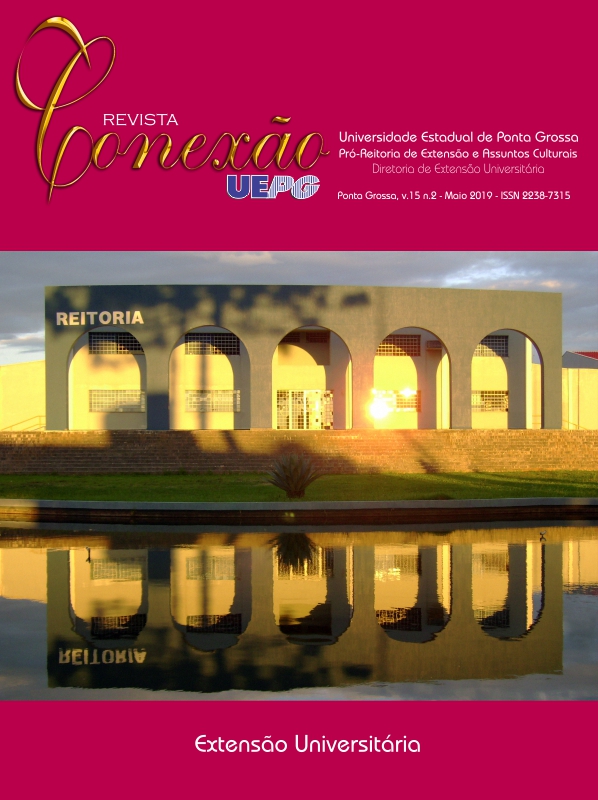DO NEDET À INCUBAÇÃO: TRAJETÓRIA DAS AÇÕES DE EXTENSÃO UNIVERSITÁRIA NO ÂMBITO DA ABORDAGEM TERRITORIAL DO DESENVOLVIMENTO
DOI :
https://doi.org/10.5212/Rev.Conexao.v.15.i2.0002Mots-clés :
Extensão Universitária, Desenvolvimento Territorial, Incubação de Projetos Sociais.Résumé
Este trabalho objetiva efetuar um balanço crítico da trajetória de atuação extensionista do Núcleo de Extensão em Desenvolvimento Territorial Centro Serra (NEDET CS), no período 2014-2017. Os NEDETs foram criados através da Chamada Pública CNPq/MDA/SPM-PR Nº 11/2014 com o objetivo de estruturar equipes de assessoramento aos Colegiados de Desenvolvimento Territorial (CODETERs). Na Universidade Federal de Santa Maria, foi constituído o NEDET CS para atuação no Território Centro Serra do Rio Grande do Sul. Entre 2014 e 2017, foram desenvolvidas atividades voltadas à gestão social e inclusão produtiva. A análise das ações realizadas aponta que o NEDET deu organicidade e promoveu a participação social no CODETER, realizou 115 atividades e mobilizou a execução de 2,6 milhões de reais. Conclui-se, assim, que o NEDET teve um papel positivo na articulação e no desenvolvimento do Território CS, além de ser um espaço privilegiado de formação acadêmica através das ações de pesquisa e extensão desenvolvidas.
Téléchargements
Références
ASSIS, W. S. Redes sociais para o processo de inovação em comunidades rurais. In: SIMÕES, A. et al. (Org.) Agricultura familiar: métodos e experiências de pesquisa-desenvolvimento. Belém: NEAF, 2001. p. 23-54.
BRASIL. Ministério do Desenvolvimento Agrário (MDA). Secretaria de Desenvolvimento Territorial (SDT). Plano Territorial de Desenvolvimento Rural Sustentável: guia para o planejamento. Brasília: MDA/SDT, 2005. 63 p. Disponível em: <http://sge.mda.gov.br/bibli/documentos/tree/doc_220-28-11-2012-12-04-356539.pdf>. Acesso em: 22 set. 2016.
________.________.________. Plano territorial de desenvolvimento rural sustentável do Território Centro Serra. Brasília: SDT/MDA, 2009. 73 p. Disponível em: . Acesso em: 21 jun. 2016.
________.________.________. Perfil Territorial Centro Serra. Brasília: CGMA, 2015. Disponível em: . Acesso em: 21 jun. 2016.
________.________.________. Balanço de gestão: Resultados das ações da SDT 2015-2016. Brasília: MDA/SDT, 2016. 89 p.
CALGARO NETO, S.; DIESEL, V. Redes Sociais e Constituição de Referentes Técnicos em Cooperativa de Piscicultores em Santa Maria, RS. In: CONGRESSO DA SOBER, 47., 2009, Porto Alegre/RS. Anais.... Porto Alegre/RS: Universidade Federal do Rio Grande do Sul, 2009. 18 p.
CANIELLO, M.; PIRAUX, M. Avanços, dilemas e perspectivas da governança territorial no Brasil: reflexões sobre o Programa de Desenvolvimento Sustentável de Territórios Rurais (PRONAT). Anales del Congreso Internacional Gestión Territorial Para el Desarrollo Rural. (Red GTD). Bogotá, 2015. 102 p.
CARRIÈRE, J. P.; CAZELLA, A. A. Abordagem introdutória ao conceito de desenvolvimento territorial. Eisforia, Florianópolis, v. 4, n. especial, p. 23-48, dez., 2006.
CASTRO-GÓMEZ, S.; GROSFOGUEL, R. (Comp.). El giro decolonial: reflexiones para una diversidad epistémica más allá del capitalismo global. Bogotá: Siglo del Hombre Editores; Pontificia Universidad Javeriana, Instituto Pensar, 2010. 133 p.
ESCOBAR, A. El “postdesarrollo” como concepto y práctica social. In: MATO, D. (Org.). Políticas de economía, ambiente y sociedad en tiempos de globalización. Caracas: Universidad Central de Venezuela, 2005. p. 17-31.
______. La invención del Tercer Mundo: construcción y deconstrucción del desarrollo. Bogotá: Editorial Norma, 2007.
FAVARETO, A. A. Paradigmas do desenvolvimento rural em questão. São Paulo: Iglu/Fapesp, 2007. p.220.
______. Abordagem territorial do desenvolvimento rural - mudança institucional ou "inovação por adição"? Estudos Avançados, São Paulo, v. 24, n. 68, 2010. p. 299-319.
FROEHLICH, J. M. (Org.). Desenvolvimento territorial: produção, identidade e consumo. Ijuí: Ed.Unijuí, 2012. p.288.
GEILFUS, F. 80 herramientas para el desarrollo participativo: diagnóstico, planificación, monitoreo, evaluación. San José, C.R.: IICA, 2002. p.29-64.
GUANZIROLLI, C. Desenvolvimento territorial rural no Brasil – uma polêmica. In: FROEHLICH, J. M. (Org.). Desenvolvimento Territorial: Produção, identidade e Consumo. Ijuí: Ed. Unijuí, 2012. p.203-224.
MALDONADO-TORRES, N. Sobre la colonialidad del ser: contribuciones al desarrollo de un concepto. In: CASTRO-GÓMEZ, S.; GROSFOGUEL, R. (Comp.). El Giro Decolonial. Reflexiones para uma diversidade epistémica mas allá del capitalismo global. Bogotá, Siglo del Hombre Editroes, Universidad Central, Instituto de Estudios Sociales Contemporáneos y Pontifica Universidad Javerias, Instituto Pensar, 2007, p. 127-168.
SABOURIN, E.; MASSARDIER, G.; SOTOMAYOR, O. As políticas de desenvolvimento territorial rural na América latina: uma hibridação das fontes e da implementação. Mundos Plurales, Quito, Ecuador, v.3, n. 1, p. 75-98, 2015.
SUMPSI, J.M. Desarrollo rural com enfoque territorial: diferencias e semejanzas de las experiências de la Unión Europea y América Latina. In: ORTEGA, A.C.; ALMEIDA FILHO, N. (Orgs.). Desenvolvimento territorial, segurança alimentar e economia solidária. Campinas: Alínea, 2007. p. 30-86.
TOMMASINO, H.; FABREAU, M.; GUEDES E. Mapeo de los actores sociales: una metodología de visualización relacional y posicional. Introducción a un enfoque reticular en el marco del desarrollo local. In: TOMMASINO, H.; HEGEDUS, P. Extensión: reflexiones para la intervención en el medio rural. Montevideo: Universidad de la República – Facultad de Agronomía, 2006. p. 231-244.
Téléchargements
Fichiers supplémentaires
Publié-e
Numéro
Rubrique
Licence
a) Os autores mantêm os direitos autorais e concedem à revista o direito de primeira publicação, com o trabalho simultaneamente licenciado sob a Creative Commons Attribution License que permite o compartilhamento do trabalho com reconhecimento da sua autoria e publicação inicial nesta revista.
b) Ao submeter um artigo à Revista Conexão UEPG e tê-lo aprovado os autores concordam em ceder, sem remuneração, os seguintes direitos à Revista: os direitos de primeira publicação e a permissão para que a Revista redistribua esse artigo e seus metadados aos serviços de indexação e referência que seus editores julguem apropriados.
c) Os leitores são livres para transferir, imprimir e utilizar os artigos publicados na Revista, desde que haja sempre menção explícita ao(s) autor (es) e à Revista Conexão UEPG e que não haja qualquer alteração no trabalho original. Qualquer outro uso dos textos precisa ser aprovado pelo(s) autor (es) e pela Revista.

Este obra está licenciado com uma Licença Creative Commons Atribuição 4.0 Internacional.





